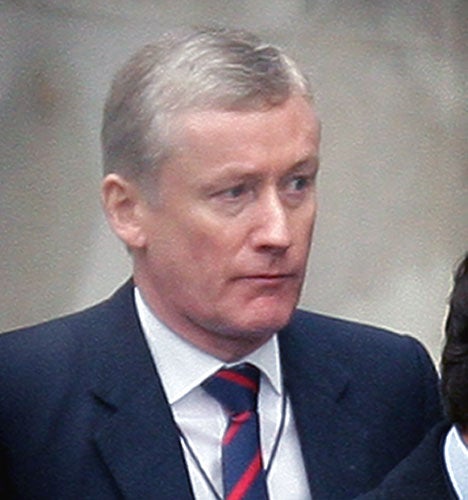Goodwin agrees to scrape by on £342,500 a year
Banker who presided over the collapse of RBS bows to public pressure and accepts 40 per cent reduction in his pension deal

Your support helps us to tell the story
From reproductive rights to climate change to Big Tech, The Independent is on the ground when the story is developing. Whether it's investigating the financials of Elon Musk's pro-Trump PAC or producing our latest documentary, 'The A Word', which shines a light on the American women fighting for reproductive rights, we know how important it is to parse out the facts from the messaging.
At such a critical moment in US history, we need reporters on the ground. Your donation allows us to keep sending journalists to speak to both sides of the story.
The Independent is trusted by Americans across the entire political spectrum. And unlike many other quality news outlets, we choose not to lock Americans out of our reporting and analysis with paywalls. We believe quality journalism should be available to everyone, paid for by those who can afford it.
Your support makes all the difference.Sir Fred Goodwin, the former Royal Bank of Scotland chief executive who led the company to the brink of collapse and whose £16m pension provoked national outrage, has agreed to a £200,000 reduction in his annual payout.
The 50-year-old, who was in charge of RBS when it recorded the worst losses ever seen by a British company, has volunteered to have his pension reduced from £555,000 a year to £342,500 – a cut of 38 per cent.
His decision was welcomed by the Chancellor, Alistair Darling, who said: "I'm very glad that RBS have now resolved the matter with Sir Fred Goodwin. I think that Sir Fred is doing the right thing.
"What I want to do now is to make sure that we rebuild RBS and all its banking operations – that's absolutely essential, not just for the bank but for the thousands of people who work for that bank and for the economy as a whole."
The final year of Sir Fred's tenure saw RBS register a pre-tax loss of £24.1bn, a UK record. The bank had to be bailed out by the Government, which now owns 70 per cent of the company.
However, despite his failings, which included the disastrous £49bn acquisition of the Dutch bank ABN Amro just before the credit crunch, Sir Fred was allowed to resign and claim his pension rather then being sacked.
Instead of claiming the £703,000 a year he was entitled to, he elected to take a tax-free lump sum of £2.7m and have his annual pension cut to £555,000. He agreed to give up a year's salary worth £1.1m, which he was due in lieu of notice.
But despite retiring at 50, a decade earlier than the official RBS retirement age, he was still entitled to his full payment under the bank's pension scheme rules. As a result, his pension pot increased from £10.2m to £16.6m. After yesterday's reduction agreement, it stands at £11.9m.
RBS chairman Sir Philip Hampton said: "On any measure this represents a very substantial reduction to Fred's pension and is an acceptable amount to all parties to the discussion. I am very pleased that we have resolved a situation that has been a difficult and unhappy one for all the parties involved, and it is to Fred's credit that he has done this on a voluntary basis." But Rob MacGregor, of the Unite union, said: "For the diabolical failure by Fred Goodwin which led to the near collapse of RBS, this small gesture represents only a fraction of the massive pension that he is walking away with. Goodwin will still enjoy a very comfortable future at the expense of the taxpayer."
The details of Sir Fred's pension provoked a tide of public revulsion and prompted Gordon Brown to suggest he should forgo some of it. The Prime Minister described the amount as "unjustifiable and unacceptable". The Banking minister Lord Myners asked Sir Fred to volunteer a reduction in his pension, but the banker refused.
A source close to Sir Fred told The Independent yesterday that it was always his intention to hand back part of his pension, but that he had been waiting until the conclusion of an internal inquiry which examined its legality as well as his conduct, expenses and use of company assets.
The source said: "Fred would like to bring the very public and political battle to an end and have a life and a future at the end of it. This will help towards achieving that."
Sir Philip appeared to corroborate this version of events.
However, some have already dismissed Sir Fred's act of charity as a PR exercise intended to quell public anger. In March, an anti-banking group smashed the windows of his home in Edinburgh and vandalised his car. Since then, Sir Fred, his wife and their two children have been living in a rented villa near Cannes in the South of France.
Join our commenting forum
Join thought-provoking conversations, follow other Independent readers and see their replies
Comments